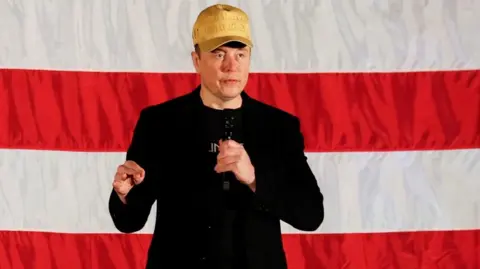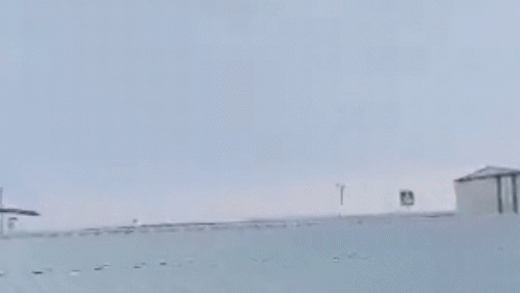 Reuters
ReutersQuestions have been raised about the legality of cash incentives offered by tech billionaire Elon Musk to swing-state voters who sign his petition before the US election on 5 November.
The petition was created by Mr Musk’s campaign group America PAC, which was set up to support Donald Trump in the presidential contest.
Voters in Pennsylvania are being offered cash sums for simply signing the petition. And one random swing-state signatory a day is being given a million-dollar prize.
But legal experts have suggested that it may break American law to offer money for an act requiring someone to be signed up as a voter. BBC News has contacted Mr Musk’s team and America PAC for comment.
What is Musk offering?
The petition created by America PAC encourages voters in six swing states – Georgia, Nevada, Arizona, Michigan, Wisconsin and North Carolina – to sign a “petition in favour of free speech and the right to bear arms”.
Those who refer another voter who signs up are promised a sum of $47 (£36) each.
Higher sums of $100 for signing or referring are offered in Pennsylvania, the battleground state that both the Trump and Harris campaigns believe could potentially decide the race’s eventual victor.
America PAC says those who sign the petition are signalling their support for the First and Second amendments of the US Constitution.
Each day until polling day on 5 November, a $1m prize will be randomly awarded to any signatory in one of the seven swing states.
The first lottery-style jumbo cheque was handed out to a surprised attendee at a town hall event in Pennsylvania on 19 October.
Is it legal?
“I believe [Elon] Musk’s offer is likely illegal,” said Paul Schiff Berman, the Walter S. Cox professor of law at the George Washington University.
He pointed to the US Code on electoral law, which states that anyone who “pays or offers to pay or accepts payment either for registration to vote or for voting” faces a potential $10,000 fine or a five-year prison sentence.
“His offer is only open to registered voters, so I think his offer runs afoul of this provision,” Mr Berman told the BBC.
The Us Department of Justice declined to comment. The Federal Election Commission (FEC) has been approached for comment.
The strategy may be covered by a loophole, because no-one is being directly paid to register or vote, a former chairman of the FEC suggested.
Brad Smith told the New York Times the giveaway was “something of a grey area” but “not that close to the line.”
“He’s not paying them to register to vote. He’s paying them to sign a petition – and he wants only people who are registered to vote to sign the petition. So I think he comes out OK here,” he said.
But an election law professor at Northwestern University told the BBC that the context is important.
“I understand some analysis that it’s not illegal, but I think here combined with the context it’s clearly designed to induce people to register to vote in a way that is legally problematic,” Michael Kang said.
Adav Noti of the non-partisan Campaign Legal Center said Mr Musk’s scheme “violates federal law and is subject to civil or criminal enforcement by the Department of Justice”.
“It is illegal to give out money on the condition that recipients register as voters,” Mr Noti told the BBC.
What have Democrats said?
Pennsylvania Governor Josh Shapiro, a Democrat, described the move as “deeply concerning” and called for law enforcement agencies to investigate.
In response, Mr Musk said it was “concerning that he would say such a thing”.
Billionaire investor Mark Cuban, who has campaigned in recent weeks for Kamala Harris, said the offer was both “innovative and desperate”.
“You only do that because you think you have to, but using a sweepstake is not a bad idea. Whether or not it will work is another whole thing. It could just as easily backfire,” he told CNBC.
Is there a precedent?
Mr Musk has pushed back against the criticism, arguing that Democrats and their donors have funded similar initiatives in the past.
On X, he shared a post which said the boss of Meta, Mark Zuckerburg “did the same thing in 2020”.
Mr Zuckerburg donated $400m in the 2020 election – but this was given to two non-partisan organisations to help with the logistics around postal ballots. It was not given directly to voters.
The Democratic Party has invested in initiatives in the past elections to mobilise supporters, such as a $25m voter registration campaign in the 2022 US midterm elections.
However, this money also was not given directly to voters. The funding went toward initiatives that encouraged voters to register, such as employing people to knock on doors and television and digital advertising.
“It’s legal to pay people to go out to register voters, but you can’t pay people directly to register,” said Prof Kang.
What else has Musk done?
The world’s richest man had an uneven relationship with Trump when Trump was president, but Mr Musk increasingly has voiced his displeasure with Democrats in recent years.
Ahead of the 2022 midterm elections, he announced that he had left the party and encouraged his followers to vote Republican.
This year, he has involved himself in American politics like never before, making donations and supportive social media posts on behalf of several Republicans.
In comments last week, he described much of the US-Mexico border as tantamount to the film World War Z.
Mr Musk launched America PAC in July with the aim of supporting Trump’s 2024 campaign for president. He has so far donated at least $75m to the group.
America PAC’s website says it wants “secure borders”, “safe cities”, “free speech”, “sensible spending”, a “fair justice system” and “self-protection”.
Trump said on Sunday that he had not followed Mr Musk’s giveaway, but described him as a friend.
In recent weeks, Mr Musk has appeared on the campaign trail for the first time, first by Trump’s side and more recently in town hall appearances by himself.

Source link
#Musks #1maday #cash #giveaway #voters #legal



















